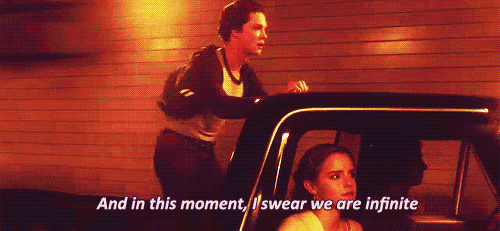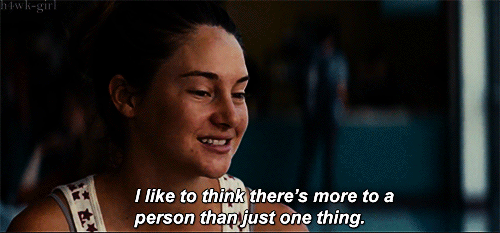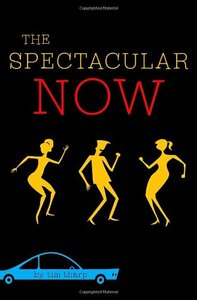You need to sign in or sign up before continuing.
Take a photo of a barcode or cover
2.5 stars
I thought this book was okay, it was enjoyable at certain parts, but I felt myself getting really annoyed most of the time. I didn't really like any of the characters. Aimee seemed to naive and dependent on Sutter and that bothered the hell out of me. Sutter was okay at first, but in the end I was just like what the hell? This kid didn't learn anything.
I thought this book was okay, it was enjoyable at certain parts, but I felt myself getting really annoyed most of the time. I didn't really like any of the characters. Aimee seemed to naive and dependent on Sutter and that bothered the hell out of me. Sutter was okay at first, but in the end I was just like what the hell? This kid didn't learn anything.
Oh my God! Where has this book been all my life?! Why am I just now reading it?!? This is hands down the most honest look at teenage "romance." There aren't knights in shining armor. People have flaws, there is no perfect relationship. There is no happy ending, this is a real look at how many guys are... not perfect! Instead of the usual girl meets perfect boy (ie knight in shining armor) this is the story of a boy who isn't perfect. He's a funny likable guy and girls love him, but he's not a good guy and he knows it. The whole time you root for bad boy Sutter to turn his life around and be the boyfriend that Aimee loves and deserves. But life isn't always that cut and dry! People have real flaws to work with! Sutter is a high school student who drinks from sun up to sun down, he's always the life of the party. Girls love him, guys want to be him. He's so at ease with everything and takes nothing seriously. He has no life ambitions and just lives from day to day. Then comes Aimee a shy, quiet nerd, Sutter thinks that she can be his charity case and he'll give her the skills and confidence that she so desperately needs. But of course that's not how it works does it? They start to fall in love with each other. She brings out a new side in Sutter that he's not sure he likes.
Soo funny, witty, honest, and heartbreaking. I loved this book and the movie adaptation of it. Miles Teller was THE PERFECT choice to portray Sutter. A definite must read and a must see!
Soo funny, witty, honest, and heartbreaking. I loved this book and the movie adaptation of it. Miles Teller was THE PERFECT choice to portray Sutter. A definite must read and a must see!
I didn't hate this book, but I didn't love it either and I think the reason for that is Sutter himself. He wasn't a bad narrator. The writing was believable for a teenage boy who just wants to live in the moment and can't be bothered to plan out a future. However, he's not a good guy. Sure he's supposed to be the charismatic school clown, but reading from his perspective makes the reader realize how misguided he is. How much of an ignorant jerk Sutter can be.
In the film, he comes across as a guy with good intentions but no drive to accomplish anything, Aimee is this shy, outcast of a girl who is comfortable in her skin. In the book he isn't as kind hearted and Aimee is painfully awkward and self conscious.
The storyline is very real and it progresses exactly the way it would in real life, and that makes it uncomfortable to read. The ending is very up in the air and leaves the reader craving the loose ends be tied up, but they aren't. I understand the literary choice, but it makes it difficult to rate the book. It's realistic, but it isn't what a lot of readers would want in their contemporary fiction.
In the end, I am glad I read it. I recommend this book for people looking for a poignant look into the life of a boy that could be any teenager off the street. I think this would be a great book to read for school and can see how a lot of aspects to the story can be discussed and debated among students.
If you're looking for something a little more heartwarming, I recommend watching the movie. It's rated R, and still has the essence of the book's story, but it also has a sweeter edge to it.
In the film, he comes across as a guy with good intentions but no drive to accomplish anything, Aimee is this shy, outcast of a girl who is comfortable in her skin. In the book he isn't as kind hearted and Aimee is painfully awkward and self conscious.
The storyline is very real and it progresses exactly the way it would in real life, and that makes it uncomfortable to read. The ending is very up in the air and leaves the reader craving the loose ends be tied up, but they aren't. I understand the literary choice, but it makes it difficult to rate the book. It's realistic, but it isn't what a lot of readers would want in their contemporary fiction.
In the end, I am glad I read it. I recommend this book for people looking for a poignant look into the life of a boy that could be any teenager off the street. I think this would be a great book to read for school and can see how a lot of aspects to the story can be discussed and debated among students.
If you're looking for something a little more heartwarming, I recommend watching the movie. It's rated R, and still has the essence of the book's story, but it also has a sweeter edge to it.
hopeful
medium-paced
Plot or Character Driven:
Character
Strong character development:
Complicated
Loveable characters:
Complicated
Diverse cast of characters:
No
Flaws of characters a main focus:
Yes
Tharp should be proud because I've never read anything in the young adult genre to consider this side of hedonism and I've never read a book that addresses addiction so realistically. The second-best read of 2018. 4.5/5
Like many, I found The Spectacular Now by Tim Tharp cross my radar when "The Spectacular Now" movie began buzzing as a YA adaptation that gained critical acclaim. And, in a fit of impatience, I read the book and watched the movie in somewhat simultaneous order within the same day of each other.
As a disclaimer, let me say both are good. Both do have an adherence to the spirit of what the story is about but they are drastically different in how you consume them and, I feel, lead you to different philosophies in how it plays out. The book is Sutter Keely's mind, it is locked into his limitations and bolstered by his narrative, which plays consistently throughout the novel. The movie is Sutter Keely with a slight bias to his POV, but by the third act it clearly wants to drive a sledgehammer in that his views aren't reliable or accurate.
And this is why I would not recommend The Spectacular Now without reservation. Because Tharp walks a narrow and hard to navigate line in making a protagonist that is equal parts likeable and dislikeable. Sutter's narration is a strong and unique voice that has a way of making you sympathize with him because he is an overall well-intentioned kid. But he's also a self-centered alcoholic with no concept of consequences whose worldview warps the people who love him. Mostly it makes you frustrated with him, because Tharp gets you to care...even as he points the story to the inextricable ending that isn't the happy one the movie promises.
This novel lives and dies by how the reader reacts to Sutter Keely. I am in the firm belief that Tharp fully succeeds in creating a balance between Sutter's unreliable nature and the truth of the situation, but fully understand how other readers could get frustrated by his lackadaisical and oftentimes condescending views. He is oftentimes an unsympathetic self-centered dumbass. His relationship with Aimee is not a romantic beautiful thing, it's an awkward stumbling that is at times incredibly selfish and other times shows glimmers of true affection. I think the best way Tharp shows the dynamic is comparing it to Cassidy, Sutter's ex and probably the best character in the whole book in terms of being a complicated person who sometimes manages to portray her multiple dimensions through Sutter's boneheaded point of view. It's careful and there are layers to the story that suggest a particular attentiveness to the craft even as you're swept along in the always present thereness of Sutter's narration. Whether you're carried along through pure enjoyment or a growing sense of concern...
The biggest success of The Spectacular Now is that it is a book that needs to be digested to appreciate. Sure, we can read it and enjoy it as a coming of age but it is more than that, it hints to a dark past and a painfully uncertain future as bookends for this spectacular now. It is the flipside to "The Perks of Being a Wallflower" whose moment of affirmation here:

...is later met with the very sobering reality that life is more than those moments. That infinity and momentariness are conceptually at odds. And Sutter may be the real successor to Charlie in terms of a YA coming of age novel. Even if Sutter might not recognize himself as anything else beyond his moments of now and the moment of adulthood is quite achieved, Tharp gives the reader a true journey even if the ending isn't the one Hollywood provided.
But life is complicated anyway. And, besides Aimee gave a pretty good moral in her own words...
As a disclaimer, let me say both are good. Both do have an adherence to the spirit of what the story is about but they are drastically different in how you consume them and, I feel, lead you to different philosophies in how it plays out. The book is Sutter Keely's mind, it is locked into his limitations and bolstered by his narrative, which plays consistently throughout the novel. The movie is Sutter Keely with a slight bias to his POV, but by the third act it clearly wants to drive a sledgehammer in that his views aren't reliable or accurate.
And this is why I would not recommend The Spectacular Now without reservation. Because Tharp walks a narrow and hard to navigate line in making a protagonist that is equal parts likeable and dislikeable. Sutter's narration is a strong and unique voice that has a way of making you sympathize with him because he is an overall well-intentioned kid. But he's also a self-centered alcoholic with no concept of consequences whose worldview warps the people who love him. Mostly it makes you frustrated with him, because Tharp gets you to care...even as he points the story to the inextricable ending that isn't the happy one the movie promises.
This novel lives and dies by how the reader reacts to Sutter Keely. I am in the firm belief that Tharp fully succeeds in creating a balance between Sutter's unreliable nature and the truth of the situation, but fully understand how other readers could get frustrated by his lackadaisical and oftentimes condescending views. He is oftentimes an unsympathetic self-centered dumbass. His relationship with Aimee is not a romantic beautiful thing, it's an awkward stumbling that is at times incredibly selfish and other times shows glimmers of true affection. I think the best way Tharp shows the dynamic is comparing it to Cassidy, Sutter's ex and probably the best character in the whole book in terms of being a complicated person who sometimes manages to portray her multiple dimensions through Sutter's boneheaded point of view. It's careful and there are layers to the story that suggest a particular attentiveness to the craft even as you're swept along in the always present thereness of Sutter's narration. Whether you're carried along through pure enjoyment or a growing sense of concern...
The biggest success of The Spectacular Now is that it is a book that needs to be digested to appreciate. Sure, we can read it and enjoy it as a coming of age but it is more than that, it hints to a dark past and a painfully uncertain future as bookends for this spectacular now. It is the flipside to "The Perks of Being a Wallflower" whose moment of affirmation here:

...is later met with the very sobering reality that life is more than those moments. That infinity and momentariness are conceptually at odds. And Sutter may be the real successor to Charlie in terms of a YA coming of age novel. Even if Sutter might not recognize himself as anything else beyond his moments of now and the moment of adulthood is quite achieved, Tharp gives the reader a true journey even if the ending isn't the one Hollywood provided.
But life is complicated anyway. And, besides Aimee gave a pretty good moral in her own words...

challenging
emotional
funny
sad
slow-paced
Plot or Character Driven:
Character
Strong character development:
Complicated
Loveable characters:
Yes
Flaws of characters a main focus:
Yes
Wow. Unsettling. And really, this review should be 4 1/2 stars...for a few reasons.
But first, damn you Sutter Keely.
As with the film, my main critique of this book is its depiction of Aimee--then again, perhaps that's just who this girl is. And maybe it's even more believable in the book given the ending. That said, I did want her to get angrier at Sutter (Spoiler alert: she actually does in the book. Well, sort of.) I wanted her to take that newfound confidence she found through her relationship with Sutter and throw it back into his face.
But she didn't really. And maybe that even makes the ending of the book that much more devastating.
By the way, the use of the word "devastating" here is not really a spoiler.
I'm still trying to process it and I'll probably go back and reread it now that the initial impact has lightened.
All that aside, I love Tim Tharp's rendering of Sutter. It's refreshing to read a male protagonist in what is arguably a YA book and have said protagonist not be so endearingly twee and brilliant and misunderstoond (hello, John Greene--I'm looking at you). Sutter is so real and so human that it's heartbreaking. And he's probably never read a word of Kerouac in his life which just makes it all the more real. I don't know if that makes sense, but there you go...
But first, damn you Sutter Keely.
As with the film, my main critique of this book is its depiction of Aimee--then again, perhaps that's just who this girl is. And maybe it's even more believable in the book given the ending. That said, I did want her to get angrier at Sutter (Spoiler alert: she actually does in the book. Well, sort of.) I wanted her to take that newfound confidence she found through her relationship with Sutter and throw it back into his face.
But she didn't really. And maybe that even makes the ending of the book that much more devastating.
By the way, the use of the word "devastating" here is not really a spoiler.
I'm still trying to process it and I'll probably go back and reread it now that the initial impact has lightened.
All that aside, I love Tim Tharp's rendering of Sutter. It's refreshing to read a male protagonist in what is arguably a YA book and have said protagonist not be so endearingly twee and brilliant and misunderstoond (hello, John Greene--I'm looking at you). Sutter is so real and so human that it's heartbreaking. And he's probably never read a word of Kerouac in his life which just makes it all the more real. I don't know if that makes sense, but there you go...





